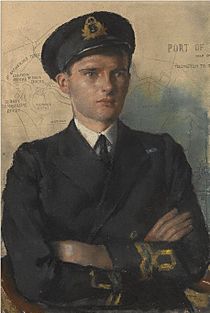Peter Danckwerts facts for kids
Quick facts for kids
Peter Victor Danckwerts
|
|
|---|---|

Lieutenant Danckwerts, RNVR, in 1941. Painted by William Dring
|
|
| Born | 14 October 1916 Emsworth, England |
| Died | 25 October 1984 (aged 68) Cambridge, England |
| Allegiance | |
| Service/ |
|
| Rank | Lieutenant |
| Unit | HMS President |
| Battles/wars | Second World War |
| Awards | George Cross Member of the Order of the British Empire |
| Other work | Shell Professor of Chemical Engineering at the University of Cambridge (1959–77) Fellow of Pembroke College, Cambridge |
Peter Victor Danckwerts (born October 14, 1916 – died October 25, 1984) was a very smart chemical engineer. He was known for his brave actions during World War II and for his important work at the University of Cambridge.
In 1940, he received the George Cross for being incredibly brave. He risked his life to defuse dangerous bombs. Later, he became a top professor at the University of Cambridge.
Early Life and Education
Peter Danckwerts was the oldest of five children. His father was Vice-Admiral Victor Hilary Danckwerts. Peter loved chemistry from a young age. He even built his own lab in the attic of his home!
He went to Stubbington House School and Winchester College. Then he studied at Balliol College, Oxford. In 1939, he earned a top degree in Chemistry.
Heroic Actions in World War II
When World War II began, Peter Danckwerts joined the Royal Naval Volunteer Reserve. He became an officer trained to deal with bombs. In 1940, he was sent to London. The city was being bombed by German planes.
He earned the George Cross for his amazing courage. He defused many land mines that the German air force (Luftwaffe) dropped. These were very dangerous magnetic mines. Peter was not even fully trained for them, but he volunteered to help.
He successfully defused them, sometimes working for almost two days straight. On one occasion, he dealt with 16 mines! His actions saved many lives.
Later in the war, he continued his bomb disposal work overseas. He was hurt in a minefield in Sicily. After that, he worked at the Combined Operations Headquarters in Whitehall. In December 1942, he was also given another award. He became a Member of the Order of the British Empire for his bravery.
Life After the War
After the war, Peter Danckwerts decided to study chemical engineering. He earned a master's degree from Massachusetts Institute of Technology in the USA. This was possible thanks to a special scholarship.
When he came back to Britain, Cambridge University received a big donation. This money helped them start a new chemical engineering department. Peter became a lecturer and researcher there.
He later joined the United Kingdom Atomic Energy Authority in 1954. In 1956, he became a professor at Imperial College London. He continued his research and teaching there. In 1959, he returned to Cambridge. He became the Shell Professor of Chemical Engineering.
As a professor, Peter Danckwerts did a lot of important research. He studied how things mix and how gases are absorbed. He became a well-known speaker around the world. In 1969, he was chosen as a Fellow of the Royal Society. This is a very high honor for scientists. He also received special degrees from other universities.
From 1965 to 1966, he was the president of the Institution of Chemical Engineers. He retired from his professorship in 1977. After that, he became an editor for a science journal. Peter Danckwerts passed away in Cambridge on October 25, 1984.
 | Georgia Louise Harris Brown |
 | Julian Abele |
 | Norma Merrick Sklarek |
 | William Sidney Pittman |

